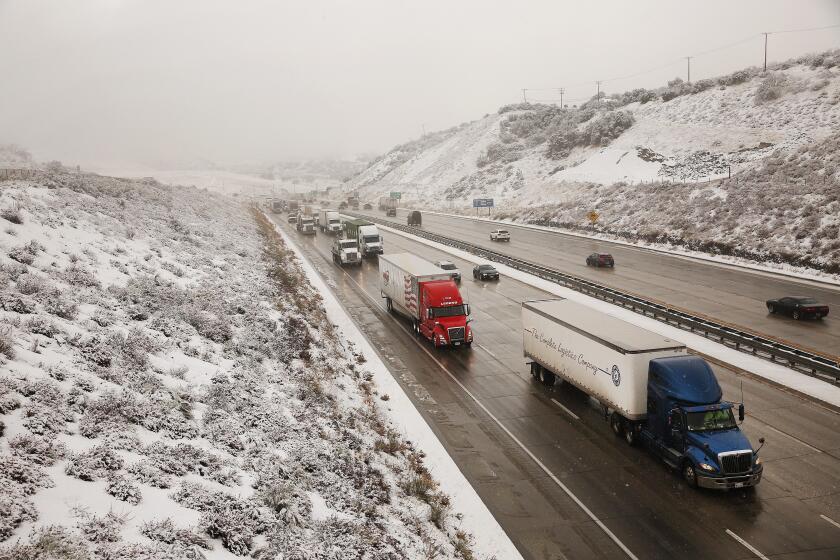D.C. rolls out plan to get a leg up on traffic
For those who say that Washington isn’t dealing with high gas prices and traffic-clogged streets, think again. It may not be congressional action, but the nation’s capital is the first city in the country to launch an elaborate, high-tech bike-sharing system, similar to popular programs in Paris, Barcelona and other European cities.
For a $40 annual fee, subscribers to SmartBike DC have access to a fleet of 100 bright-red three-speed bikes, kept in 10 electronically controlled self-service racks throughout the downtown area.
“People are familiar with car-sharing -- Zipcar and Flexcar. Now, we have bike-sharing,” Mayor Adrian M. Fenty said Wednesday at SmartBike’s kickoff event.
Like those car-sharing programs, SmartBike is targeting city residents and commuters, not tourists, said Jim Sebastian, bicycle and pedestrian program manager for the District Department of Transportation. Many of the racks are near bus and rail stops, allowing workers to take the subway downtown and then use the bikes to get around. An online map shows the location of each storage rack, the number of available bikes and the number of open slots for returns.
SmartBike is part of a 20-year contract between the city and advertising company Clear Channel Outdoor. The company agreed to renovate the city’s bus shelters and implement and maintain the bike-sharing program in exchange for advertising space in the shelters. For now, all revenues from the SmartBike program go to the city.
“Everybody is watching this launch and is very interested to see how it goes,” said Steve Ginsburg, president of Clear Channel’s Washington/Baltimore division. “Our Clear Channel offices around the country are already being contacted by their municipalities.”
SmartBike members must be 18 or older and have a valid credit card. After enrolling and paying the annual fee, they receive a “smart card” that is swiped over a sensor to unlock a bike. Rentals are limited to three hours, but riders can take a second bike as soon as the first is returned. On the program’s first day, 20 bikes were checked out, and all were returned on time.
Washington isn’t the first city to try such a program, but its effort differs from others’ in significant ways that supporters say will ensure its success. In cities like Portland, Ore., and Austin, Texas, for example, bike-sharing programs used old or discarded cycles that were painted one color and made available on the honor system. Many of these bikes were misplaced, stolen or vandalized.
By contrast, Washington’s program is modeled on systems in some of Europe’s largest cities. Paris’ Velib’ program, which began in July 2007, now has 16,000 bikes and more than 200,000 subscribers.
“If we are only half as successful as the European model, it will be a huge success,” Sebastian said.
The programs in the European cities and in Washington have piqued the interests of other big cities in the United States. Sebastian said he had heard from officials in Philadelphia, Boston and Albuquerque
New York Mayor Michael R. Bloomberg expressed interest in Velib’ after visiting Paris last summer, but he has raised concerns about rider safety and liability issues.
SmartBike members will be sent safe-cycling booklets and will assume most of the risk, Sebastian said. Helmets, though strongly encouraged, are not provided and are not required by city law for riders 16 or older.
Vandalism is also a concern, but Fenty said he was taking a wait-and-see approach. “We don’t stop doing something because something negative happens,” he said. “If something like vandalism happens, we’ll address it.”
Clear Channel Outdoor is considering webcams and global positioning systems to monitor storage racks and bikes, said John Sis, the company’s senior regional information technology manager.
If a bicycle is damaged or stolen, the renter’s credit card could be charged as much as $550, the cost of the bike.
For now, the city and Clear Channel Outdoor are planning to take it slow to work out any kinks. Even before the program’s official launch, 150 people had signed up.
“This will get people out of their cars,” said Fenty, an avid cyclist who frequently trains with a local racing team. “It is good for themselves and the environment.”
--
More to Read
Sign up for Essential California
The most important California stories and recommendations in your inbox every morning.
You may occasionally receive promotional content from the Los Angeles Times.










